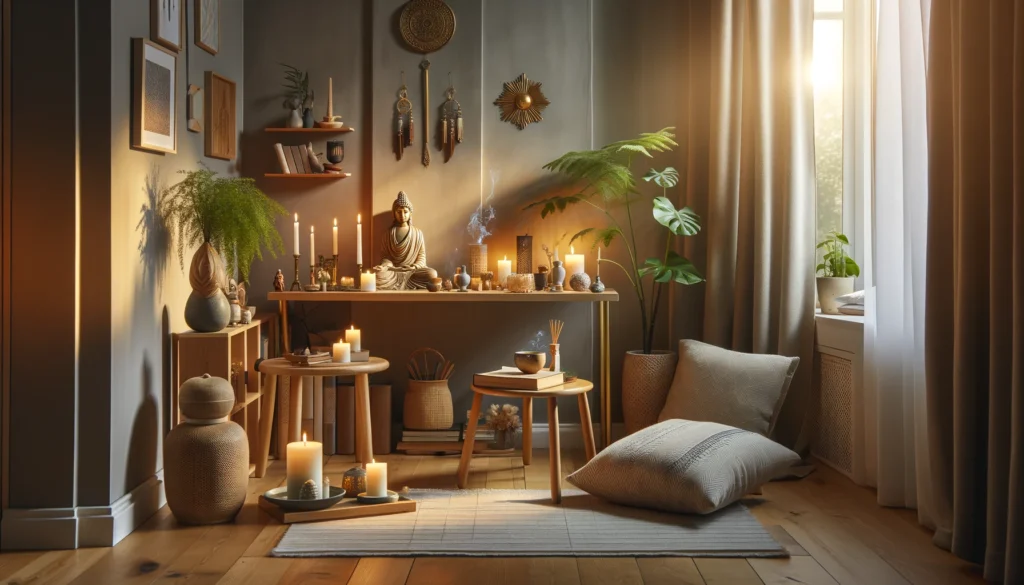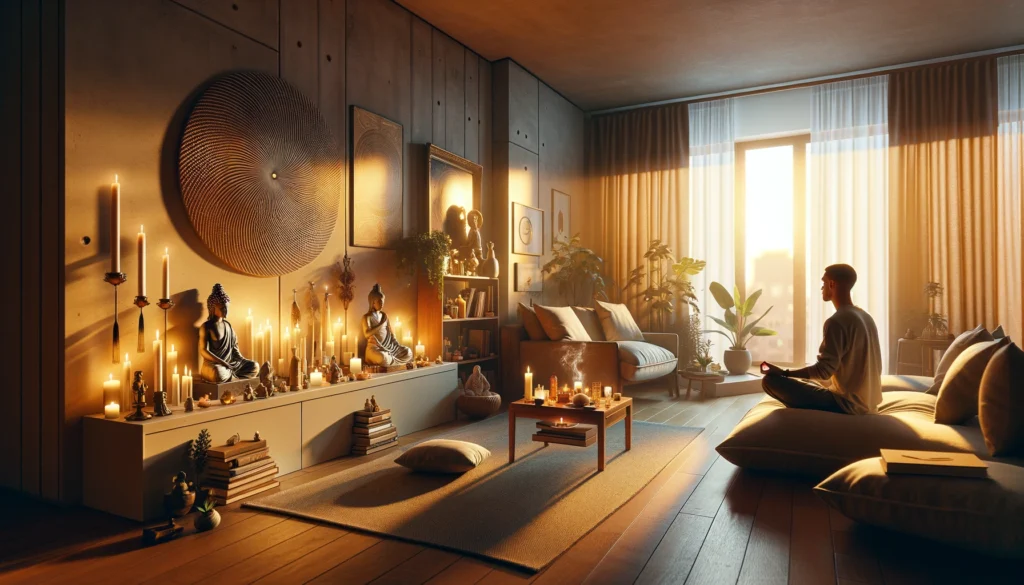A Spiritual Altar in Your Home For Peace And Reflection
buddhaindooroutdoor.com participates in the Amazon Services LLC Associates Program, an affiliate advertising program designed to provide a means for sites to earn advertising fees by advertising and linking to Amazon.com.
Discover how to create a spiritual altar in your home to foster peace, reflection, and a deeper connection with your spirituality.
It’s about transforming a corner of your home into a conduit for peace, a place where the spiritual realm gently touches the mundane, inviting a sense of calm and introspection into your daily life.
A spiritual altar in your home acts as a tangible expression of your innermost beliefs and aspirations. It’s a space where you can lay down your burdens, offer your dreams, and bask in the tranquility that comes from knowing you’re aligned with your spiritual path.
This altar is not just an assembly of objects but a vibrant, living entity that mirrors the depth of your spirit, a dedicated spot where the tangible meets the intangible, creating a haven for meditation and a focal point for your aspirations.
Table of Contents
Finding the Perfect Spot for Your Altar In Your Home

The quest for the ideal location for your spiritual altar is a reflective journey, urging you to consider where in your home you feel most at peace.
This choice is crucial as it determines the energy flow and accessibility of your sacred space.
Whether it’s a sunlit corner of your bedroom that greets the dawn or a central part of your living area that stands as a constant spiritual companion, the key lies in finding a spot where tranquility reigns supreme.
For those fortunate to have outdoor space, situating your altar in the garden can create a unique connection with nature, rooting your spiritual practices in the earth’s natural rhythms.
This chosen spot becomes your personal sanctuary, a retreat from the outer world’s noise, resonating with your spiritual intentions and serving as a portal to inner peace.
A Daily Practice of Peace and Reflection With A Spiritual Altar in Your Home

Engaging with your spiritual altar daily becomes a grounding and centering practice, a sacred moment to pause and immerse yourself in reflection.
This ritual, whether it involves meditation, prayer, or simply sitting in silence, nourishes your spirit and reinforces your connection to the divine.
It’s a practice that turns your altar into a source of strength and comfort, reminding you of your journey and the resilience it embodies.
As you interact with your altar, remember that it is a living extension of your inner world, evolving with you as you walk your spiritual path.
This space is not just a passive backdrop but an active participant in your journey, offering solace, joy, and a deeper understanding of yourself and the universe.
Curating Your Sacred Space: Choosing Elements That Resonate

The act of curating your spiritual altar involves selecting items that speak to your soul, from symbols of faith and natural elements to personal mementos and ritual tools.
These elements play a pivotal role in defining the energy and purpose of your sacred space.
By thoughtfully choosing items that resonate with your journey and arranging them with intention, you create a sanctuary that not only enhances your home but also serves as a source of spiritual nourishment.
As you maintain and adapt your altar, it becomes a reflection of your evolving spiritual path, a dynamic testament to your growth.
This sacred space is more than just a part of your home; it’s a portal to peace, a cornerstone of your spiritual practice, and a beacon of light in the swirling tides of life.
Essential Components for Your Spiritual Altar in Your Home
1. Focus Items for Personal Significance
- Symbols of Faith: Whether it’s a statue, icon, picture, or any emblem of your spiritual or religious beliefs, these items serve as the cornerstone of your altar, grounding your space in the energies that resonate most deeply with your soul.
- Natural Elements: Incorporating elements like stones, crystals, plants, water, or earth connects your altar to the natural world, bringing in the grounding and cleansing energies of Mother Earth.
- Personal Mementos: Items with sentimental value or that represent significant moments in your spiritual journey can make your altar truly yours, creating a bridge between your past experiences and present aspirations.
2. Tools for Ritual and Reflection
- Candles and Incense: The element of fire in candles can symbolize enlightenment, warmth, and the presence of the divine, while incense can cleanse the space and draw in positive energies. Both are also excellent for marking the beginning and end of a meditation or prayer session.
- Sacred Texts or Writings: Incorporating spiritual or religious texts that you find inspiring can offer guidance and reflection, making your altar a source of wisdom and insight.
- Crystals and Gemstones: Each stone carries its own energy and properties, which can aid in healing, protection, grounding, or amplifying your intentions.
3. Items for Decoration and Atmosphere
- Cloths and Fabrics: A beautiful cloth can serve as the foundation of your altar, setting a distinct tone and defining the sacred space. The colors and patterns can be chosen to align with your spiritual intentions or simply to create an aesthetic that pleases you.
- Artwork and Statues: Art that speaks to your soul or statues of deities, Buddha, angels, or spiritual figures can add depth and inspiration to your altar, serving as focal points for meditation and contemplation.
Setting Up Your Sacred Space
As you gather these items, remember that the placement of each element on your altar should be intentional, creating a harmonious balance that supports your spiritual practices.
The process of setting up your altar is as much a part of the ritual as its daily use.
Cleansing each item before placing it on your altar can clear away any previous energies and charge them with your personal intentions.
Maintaining Your Spiritual Altar In Your Home

The spiritual altar in your home is not just a static display of personal and sacred items; it’s a dynamic, living reflection of your spiritual journey.
Just as our souls are ever-evolving, so too should our altars adapt and change to mirror our growth, discoveries, and the shifts in our spiritual path.
Maintaining your spiritual altar is a practice in mindfulness and intent, ensuring that it continues to serve as a source of inspiration, comfort, and connection to the divine.
Regular Cleansing: Ensuring Purity and Clarity
Just like any space dedicated to spiritual practices, your altar requires regular cleansing to maintain its sanctity and effectiveness.
This can involve physically cleaning the surface and items to remove dust and debris, but it also extends to energetic cleansing.
Utilizing sage, palo santo, or even sound vibrations from bells or singing bowls can help clear the space of stagnant or negative energies.
This act of purification not only maintains the altar’s physical beauty but also reaffirms your commitment to keeping this space sacred and charged with positive intentions.
0 Comments